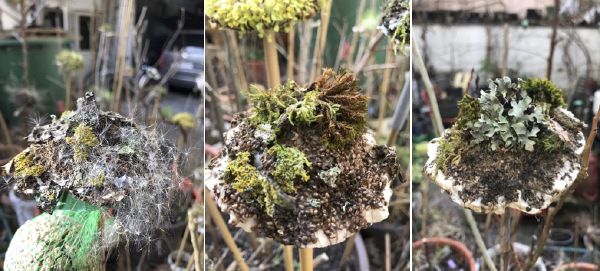No edit summary |
No edit summary |
||
| Line 1: | Line 1: | ||
[[File:mooseundalgen@KlausFritze.jpg|600px|mooses and algae. Photos and experiments: Dr. Klaus Fritze]] | [[File:mooseundalgen@KlausFritze.jpg|600px|mooses and algae. Photos and experiments: Dr. Klaus Fritze]] | ||
[[:Category:Werkmodul|Werkmodul]] [[:Category:Fachmodul|Fachmodul]]<br /> | |||
''Lecturer(s):'' Dr. Jan Vondrak, Dr. Katja Bühler, Zackery Denfeld, Mario Behling<br /> | |||
''Credits:'' 4 [[SWS]]<br /> | |||
''Venue:'' DIY Biolab @ [[Marienstraße 7b]], [[Marienstraße 7b/202|Room 202]]<br /> | |||
''BBB:'' https://meeting.uni-weimar.de/b/min-ypy-xev-isf | ''BBB:'' https://meeting.uni-weimar.de/b/min-ypy-xev-isf | ||
| Line 21: | Line 26: | ||
===Workshop with Katja Bühler on photosinthesis/biofilms=== | ===Workshop with Dr. Katja Bühler on photosinthesis/biofilms=== | ||
Scheduled: Nov 19 and Nov 28, 2022 | Scheduled: Nov 19 and Nov 28, 2022 | ||
Revision as of 21:26, 5 October 2022
Werkmodul Fachmodul
Lecturer(s): Dr. Jan Vondrak, Dr. Katja Bühler, Zackery Denfeld, Mario Behling
Credits: 4 SWS
Venue: DIY Biolab @ Marienstraße 7b, Room 202
BBB: https://meeting.uni-weimar.de/b/min-ypy-xev-isf
In order to increase awareness of coexistence with living organisms, the Chair of Medial Environments proposes a set of weekend workshops in respect to climate change. The workshops include both theoretical and practical exercises for understanding the change in climate. Students will learn to inspect microorganisms while looking at them as well as learn to build and use simple tools for measuring concentrations of chemical elements in the environment.
Workshops will be given by international scholars and artists. Please follow further announcements on the GMU list, the class wiki, and/or attend the introductory session during the first week of the semester.
Workshops
Workshop with Jan Vondrak on lichens
Scheduled: Nov 12 and Nov 13, 2022
Dr. Jan Vondrak will do at least two special walks/excursions with us and we will look at the biodiversity of lichens in Weimar/Thuringia and learn about the ecophysiology of lichens in an urban (industrial ruins) and a semi-natural area (i.e. castle and landscape park Belvedere). In the biolab we will examine lichen samples microscopically and perform simple investigations on specific lichen substances. Jan Vondrak will also tell us about his research and about phylogenetic analyses and the special problems of identification and classification of lichens. Importance of lichen growth for air and climate studies, to what extent do these special mixed creatures contribute to the fixation of CO2 and nitrogen oxides and are important components of the biocrust of our world.
Dr. Jan Vondrak is an academic assistant at the University of South Bohemia, Faculty of Biological Sciences, Department of Botany in Budweis Jeske Budovice (CZ). Jan Vondrak is one of the few lichen specialists in the world and an experienced mycologist.
Workshop with Dr. Katja Bühler on photosinthesis/biofilms
Scheduled: Nov 19 and Nov 28, 2022
Katja Bühler is a professor at the TU Dresden. She conducted research (Dr. rer. nat.) at the Technical University of Hamburg-Harburg, Institute of Biotechnology II under Prof. Rudolf Müller. Bühler's research focuses on the development of alternative biotechnological reactor concepts based on in vitro and in vivo approaches.
Workshop with Zackery Denfeld on endophytes
Scheduled: Dec 2 and Dec 3, 2022
ENDOPHYTE CLUB
At the Endophyte Club (RECC) biological hobbyists meet to identify, discover, discuss and trade information about new, rare and hard to access microorganisms. The race is on: who will get to unlock, collect and share the secrets of the microbiome era?
Members of the Rare Endophyte Collectors Club will get hands-on experience setting up experiments and learning the DIY Biology methods needed to cultivate and isolate the microorganisms that live inside of plants (i.e. endophytes). We will also conduct field visits to collect plant samples and debate the use of endophytes as biopesticides as well as the ethical implications of biohacking for agriculture, the commercialization of science and the privatization of the commons. What other forms can our microbial future take?: A Lending library? An Internet of Plants? A Civilian Conservation Corps for Microbial Life?
Participants will learn how to collect agricultural plant samples (leaf, roots, etc.) and plate, grow, isolate and identify the microorganisms that grow inside the plants (Endophytes). The goal of the lab would be to discover an entirely new organism and to take this DIY Bio research forward and to prototype its promise and limitations.
Applied endophyte research is being promoted as a possible replacement for chemical fertilizers and pesticides. In addition to learning basic biological lab techniques, we will be able to imagine different food futures and various registers and modes of biohacking.
Workshop with Mario Behling on hacking Pocket Science Lab
Scheduled: Jan 13 and Jan 14, 2023


